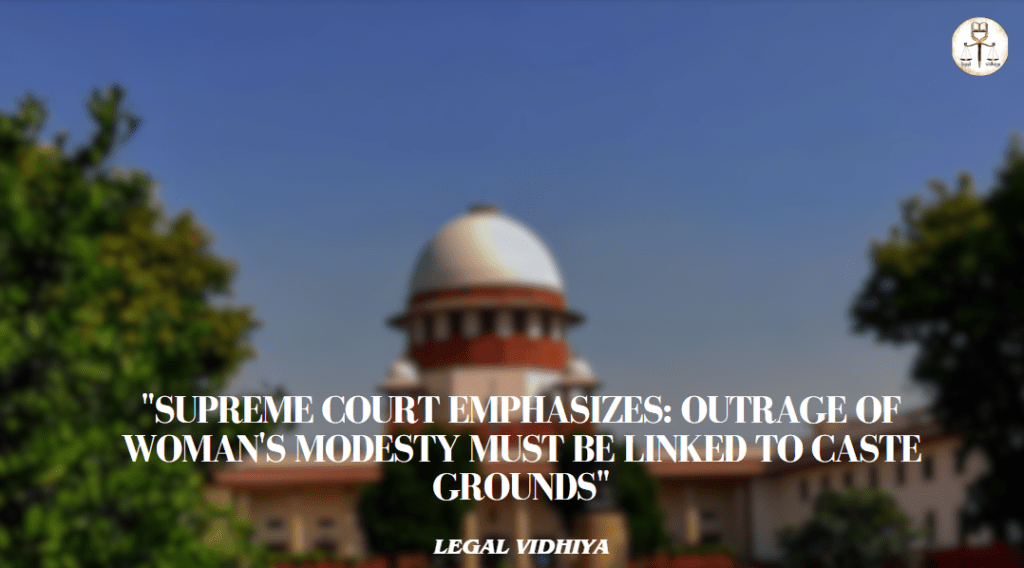
In the case under consideration, the central allegation revolved around an incident where the prosecutrix/complainant, engaged for household chores in the residence of the accused appellant, purportedly faced an attempt by the accused to outrage her modesty while she was engaged in domestic tasks. Upon thorough examination of the case record, the Court scrutinized the allegations and noted that even from the complainant’s assertions, the accused’s actions did not manifest an intention to target the victim based on her belonging to a Scheduled Caste.
To provide a comprehensive factual background, the accused-appellant had been initially convicted by the trial court on charges under Sections 451 and 354 of the Indian Penal Code, 1860 (hereinafter referred to as ‘IPC’) along with Section 3(1)(xi) of the Scheduled Castes and Scheduled Tribes (Prevention of Atrocities) Act, 1989 (hereinafter referred to as ‘SC/ST Act’). These charges pertained to house-trespass with intent to commit an offense punishable with imprisonment, assault or use of criminal force on a woman with the intent to outrage her modesty, and an offense under the SC/ST Act respectively.
Challenging the conviction, the accused filed an appeal before the High Court, which upheld the conviction under the SC/ST Act but discharged the accused of the offense committed under the IPC. The High Court based its decision on the non-compoundable nature of the offense under the SC/ST Act. Subsequently, the matter was brought before the Supreme Court by the accused for further adjudication.
Upon careful consideration, the Supreme Court observed that sustaining the conviction under Section 3(1)(xi) of the SC/ST Act required the act of outraging the modesty of a woman to be committed on the grounds of caste. The Court underscored the language of the said provision, emphasizing that the offense must be perpetrated with the explicit intention of targeting a person belonging to Scheduled Castes or Scheduled Tribes due to their caste identity.
In setting aside the concurrent findings of the lower courts, the Bench comprising Justices B.R. Gavai, Prashant Kumar Mishra, and Sandeep Mehta reiterated that a plain reading of the statute necessitated the offense of outraging modesty to be committed with a clear intention to target the victim based on their Scheduled Caste status. In support of this interpretation, the Court referenced the precedent set forth in the case of Masumsha Hasanasha Musalman Vs. State of Maharashtra (2000) 3 SCC 557.
The accused’s appeal before the Supreme Court primarily contested the conviction under the SC/ST Act by the High Court. The Court, upon thorough examination, concluded that the conviction under Section 3(1)(xi) of the SC/ST Act was unsustainable on both legal and factual grounds. Consequently, the Court acquitted the accused of the charge under the said provision.
In conclusion, the judicial journey of this case exemplifies the meticulous scrutiny exercised by the judiciary in interpreting and applying the provisions of the law, particularly those pertaining to the protection of marginalized communities. The Supreme Court’s meticulous analysis not only elucidated the requisite elements of the offense under the SC/ST Act but also underscored the importance of ensuring that legal proceedings adhere to the principles of justice and fairness.
CASE NAME : Dashrath Sahu Vs. State of Chhattisgarh
NAME – VEDIKA GUPTA, B.A.LL.B, LLOD LAW COLLEGE, INTERN UNDER LEGAL VIDHIYA
Disclaimer: The materials provided herein are intended solely for informational purposes. Accessing or using the site or the materials does not establish an attorney-client relationship. The information presented on this site is not to be construed as legal or professional advice, and it should not be relied upon for such purposes or used as a substitute for advice from a licensed attorney in your state. Additionally, the viewpoint presented by the author is of a personal nature.




0 Comments